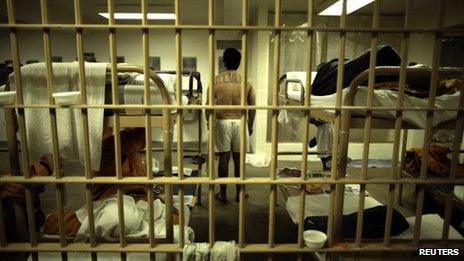US to cut back minimum sentences for some drug offences
- Published
- comments

The Obama administration has unveiled major changes to the criminal justice system, dropping mandatory minimum sentences in certain drug cases.
Such terms will not be imposed for non-violent drug offenders with no gang or cartel ties, Attorney General Eric Holder said in a speech.
The US has one of the world's biggest prison populations, despite a 40-year-low in the country's crime rates.
Critics say that heavy drug sentences have hit minorities hardest.
"We need to ensure that incarceration is used to punish, deter and rehabilitate - not merely to convict, warehouse and forget," Mr Holder said in a speech to the American Bar Association in San Francisco on Monday.
'Vicious cycle'
Under the reforms, Mr Holder is directing US prosecutors who draft indictments for certain drug offences to omit any mention of the quantity of illegal substance involved, so as to avoid triggering a mandatory minimum sentence.
Only non-violent offenders with no previous charges or ties to gangs or cartels will be affected.
He advocated sending people convicted of low-level offences to drug treatment and community service programmes instead of prison.
Mandatory minimum terms, created as part of the US "war on drugs" in the 1980s, prevent judges from applying discretion when sentencing certain drug offences.
Some 47% of US prison inmates have been incarcerated for drug offences, according to the Federal Bureau of Prisons.
"A vicious cycle of poverty, criminality and incarceration traps too many Americans and weakens too many communities," Mr Holder said on Monday.
"However, many aspects of our criminal justice system may actually exacerbate this problem rather than alleviate it."
Mr Holder also backed efforts by lawmakers to allow judges to use more flexibility with mandatory minimum sentences.
"Such legislation will ultimately save our country billions of dollars while keeping us safe."
Some states, including Texas, have already introduced programmes designed to limit incarceration of low-level offenders.
Critics of the US incarceration policy were cautiously optimistic about the change.
"The attorney general's remarks represent a good first step toward scaling back the failed 'war on drugs'," Tom Engell, chairman of Marijuana Majority, said.
But he added the "real value of these proposals will be in the implementation, which drug policy reform advocates have good reason to be wary about".
During the speech, Mr Holder also announced an expanded compassionate release for inmates facing extraordinary circumstances and who pose no threat to the public.
The policy will include elderly prisoners who did not commit violent crimes and who have already served a significant portion of their sentences.
Mr Holder also directed US attorneys to develop local guidelines on when to bring federal charges, and when to leave prosecution to state or local officials.
- Published13 August 2013
- Published27 March 2013
- Published21 December 2010